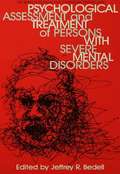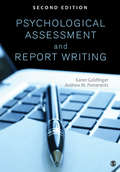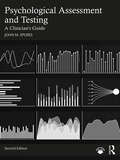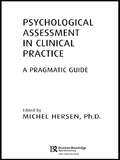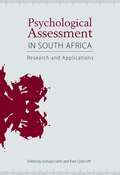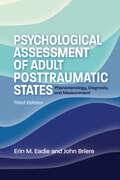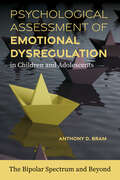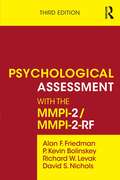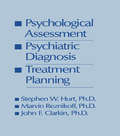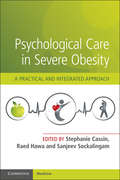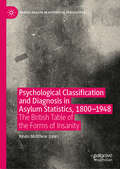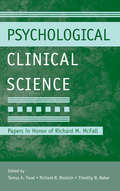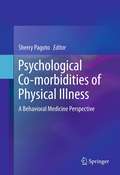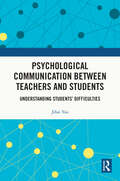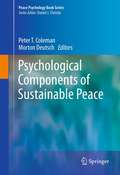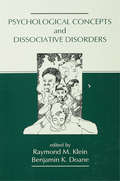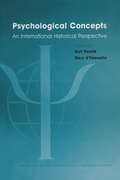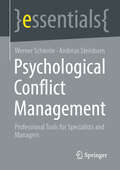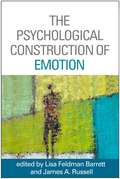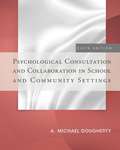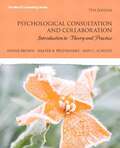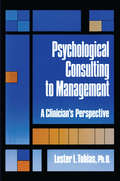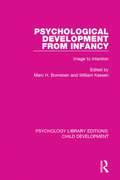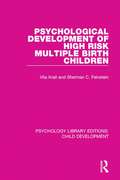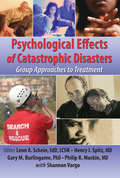- Table View
- List View
Psychological Assessment And Treatment Of Persons With Severe Mental disorders (The\series In Clinical And Community Psychology)
by Jeffrey R. BedellFirst published in 1994. Until recently, patients with severe and long-lasting mental disorders were treated primarily through hospitalisation and psychotropic medication. However, now there is a concerted effort to integrate treatment approaches from behavioural and rehabilitation therapies and social skills training.; This book presents an integration of psychological treatment and assessment practices, authored by professionals with established expertise in their subject area. Topics of fundamentally important issues have been selected and divided into three sections: assessment and treatment planning; social and vocational skills development; and group and family therapy in rehabilitation. This volume can be used as a reference handbook, a guide to clinical practice, or a classroom text describing the basic psychological approaches that are effective with patients with severe mental disabilities.
Psychological Assessment and Report Writing
by Andrew M. Pomerantz Karen B. GoldfingerOutlining a step-by-step assessment model, Psychological Assessment and Report Writing, Second Edition covers five key topics central to psychological assessment: understanding the context of a referral; determining what data is needed to answer referral questions; gathering the data; integrating the data; and communicating the findings. Authors Karen Goldfinger and Andrew M. Pomerantz review each facet of psychological assessment and report writing—providing how-to instructions and alerting readers to a myriad of issues they must consider when conducting assessments in clinical, forensic, or educational environments. Filled with varied case examples that promote interest and meet instructional requirements, including one detailed case study that recurs throughout multiple chapters, the book uses sidebars and question and answer sections to encourage readers to consider their own case material and use critical thinking skills as they review each section of the model.
Psychological Assessment and Testing: A Clinician's Guide
by John M. SporesExpanding upon and updating the first edition, this comprehensive guide instructs readers on how to effectively conduct psychological assessment and testing in their practice, efficiently advancing a case from the initial referral and clinical interview, through the testing process, and leading to informed diagnosis and treatment recommendations. This second edition incorporates updated editions of all major tests, pertinent revisions from the DSM-5, more in-depth analysis of testing topics, and coverage of new constructs that are the targets of psychological testing relevant to outpatient mental health practice. Readers will learn about the fundamentals of assessment, testing, and psychological measurement, the complete process of psychological testing using a broad range of major tests, supplemented by interpretive flowcharts and case examples.. Downloadable practice and report forms, along with data tables with pre-drafted interpretive excerpts for all tests are also available for immediate use in clinical practice. Psychologists in both practice and training will come away with the tools and knowledge needed to successfully conduct psychological assessment and testing within the contemporary mental health field.
Psychological Assessment in Clinical Practice: A Pragmatic Guide
by Michel HersenThere have been numerous books published that have dealt with psychological assessment. These books have ranged from the theoretical to the clinical. However, most of the pragmatics involved in the day-to-day activities of the psychological assessor often have been neglected in the press. In light of the above, the primary objective of Psychological Assessment in Clinical Practice is to provide the reader(students and practitioners alike) with the realities of conducting psychological assessment in clinical settings where there is not the availability of a plethora of research assistants and staff. Indeed, most individuals end up being solo practitioners or at best work in settings where they must conduct assessment themselves. This multi-authored book, then, details the specifics as to how this is done.
Psychological Assessment in South Africa: Research and applications
by Sumaya Laher and Kate CockcroftThis book provides an overview of the research related to psychological assessment across South Africa.The thirty-six chapters provide a combination of psychometric theory and practical assessment applications in order to combine the currently disparate research that has been conducted locally in this field. Existing South African texts on psychological assessment are predominantly academic textbooks that explain psychometric theory and provide brief descriptions of a few testing instruments. Psychological Assessment in South Africa provides in-depth coverage of a range of areas within the broad field of psychological assessment, including research conducted with various psychological instruments. The chapters critically interrogate the current Eurocentric and Western cultural hegemonic practices that dominate the field of psychological assessment. The book therefore has the potential to function both as an academic text for graduate students, as well as a specialist resource for professionals, including psychologists, psychometrists, remedial teachers and human resource practitioners.
Psychological Assessment of Adult Posttraumatic States: Phenomenology, Diagnosis, and Measurement
by John Briere Erin EadieThis book presents a detailed yet practical summary of the major issues and instruments involved in the assessment of posttraumatic disturbances. Aligns with APA Divisions 38 and 50. Drs. Eadie and Briere analyze the types of traumas most likely to produce long-term difficulties, and explain the biological, historical, social, and cultural factors that mediate between trauma and long-term outcome. This fully-updated new edition combines extensive research on traumatic events, including rape, stalking, sex trafficking, torture, terrorist attacks, motor vehicle accidents, and natural disasters, along with new material on complex traumas, parental disattunement and emotional neglect, drug-facilitated sexual assault, sex trafficking, pregnancy loss, COVID-19-related stressors, and exposure to social maltreatment. Especially relevant to the clinician, researcher, and forensic specialist, this book reviews the available research on standardized measures currently available for evaluating the impact of trauma, with a close evaluation of the psychometric characteristics of each instrument. A comprehensive review of new trauma-relevant measures is provided, with an emphasis on direct clinical relevance to the assessment of posttraumatic states.
Psychological Assessment of Emotional Dysregulation in Children and Adolescents: The Bipolar Spectrum and Beyond
by Anthony D. BramThis book explains the process by which assessment psychologists can evaluate and report the nature and severity of emotional dysregulation in their young patients. As referrals for clinical assessment of complex children and adolescents frequently involve questions about emotional regulation in general and the possibility of bipolar spectrum conditions in particular, trainees and practitioners will find this to be an invaluable resource. Challenges with emotional regulation are common among patients of all ages who are referred for formal psychological assessment. Understanding the nature and severity of such challenges is crucial if evaluators are to make accurate formulations and develop meaningful treatment implications. This book will illuminate the process by which an assessment psychologist evaluates and reports the nature of emotional dysregulation. It will also serve as a reference book to tailor test batteries, interpret findings related to differential diagnosis, and link test findings with meaningful treatment implications. Topics explored include detailed case examples addressing real-world referral questions, challenges around differential diagnosis, and explanations of treatment implications. Discussion of various assessment measures are considered as well, including more common measures like BASC-3 and performance-based measures as well as disorder-specific measures which may be less familiar to many clinicians. Providers will learn how to differentiate bipolar disorders from other co-occuring mental health disorders that feature dysregulated emotion, including OCD, PTSD, ADHD, and others.
Psychological Assessment with the MMPI-2 / MMPI-2-RF
by David S. Nichols Alan F. Friedman P. Kevin Bolinskey Richard W. LevakThis third edition apprises users of the MMPI-2/MMPI-2-Restructured Form (RF) for the ever-changing landscape of this dynamic personality/psychopathology instrument and its expanding utility in a variety of contexts. Two new chapters addressing the RC scales and the MMPI-2-RF are included in this updated text. Additionally, over 450 new references have been incorporated into the book, with information gathered and organized for practical clinical and forensic applications. The codetype interpretation chapter has expanded its sections with more in-depth feedback information and treatment considerations for clinicians to help in facilitating the formulation of treatment recommendations and strengthening therapeutic relationships with their clients. A number of special scales with clinical and forensic applications are also covered in this edition. An important section has been added addressing the MMPI and suicide. This new edition is a must-have resource that will inform and guide users of the MMPI-2 and MMPI-2-RF in their daily practices, and assist researchers in conceptualizing the operating characteristics and configural relationships among the various scales and indices that comprise this instrument. From simple single scale interpretation to complex configural relationships, this text addresses a broad bandwidth of interpretive information designed for text users’ at all levels of sophistication.
Psychological Assessment, Psychiatric Diagnosis, And Treatment Planning
by John F. Clarkin Marvin Reznikoff Steven W. HurtFirst published in 1991. Routledge is an imprint of Taylor & Francis, an informa company.
Psychological Care in Severe Obesity: A Practical and Integrated Approach
by Sanjeev Sockalingam Raed Hawa Stephanie CassinThis practical guide for the treatment of severe obesity and its related comorbidities covers evidence-based and emerging psychological interventions, including: motivational interviewing, cognitive behavioural therapy, mindfulness and compassion-focused interventions, technology-enabled psychological interventions and family-based interventions. The first resource of its kind to provide a detailed and integrated approach to using psychological treatments for obesity and its related comorbidities, this book will enable health care professionals to make decisions regarding the types of treatments that may be beneficial for particular issues, including disordered eating, psychological comorbidities, and treatment non-adherence. Case vignettes and clinical dialogues are used throughout to illustrate how to apply these treatments in clinical practice, making this book an essential read for any health care professional involved in the care of individuals with obesity, including psychologists, psychiatrists, physicians, nurses, social workers and dietitians.
Psychological Classification and Diagnosis in Asylum Statistics, 1800 - 1948: The British Table of the Forms of Insanity (Mental Health in Historical Perspective)
by Kevin Matthew JonesThis book provides a detailed examination of the questions that preoccupied British alienists throughout the second half of the nineteenth century. Was insanity one disorder with different forms or a set of distinct natural kinds that each had different causes, symptoms, and outlooks? Was it possible to devise a standardised classification of the insanities that provides a scientific basis to psychological diagnosis? Could statistics on psychological diagnosis provide data to help reveal the nature of insanity? The classification at the centre of these debates, the Medico-Psychological Association’s Table of the Forms of Insanity, caused deep divisions that took decades to resolve and hampered efforts to develop asylum medical statistics on psychological diagnosis. The use of the classification in national medical statistics was tantamount to being the standard classification for the asylum. As the appeal of statistics grew within medical circles, the debates intensified, and the divisions grew deeper. Despite lofty aims and years of debate, attempts to develop national statistics on psychological diagnosis had achieved very little by the beginning of the twentieth century. The failure of these efforts, hampered by the unwieldy processes adopted by Lunacy administration, led to the Table of the Forms falling into obscurity after its final set of revisions in 1932. In presenting for the first time the debates surrounding the Table of the Forms of Insanity, this volume calls for a re-evaluation of the history of psychiatric classification through its exploration of the underappreciated links between the standardisation of psychological diagnosis and the development of mental health statistics. By interrogating the links between asylum governance and the clinic, this book presents considerations on classification that still resound today, and provides valuable reading for scholars interested in the social history of medicine, the history of psychiatry, and the history of science.
Psychological Clinical Science: Papers in Honor of Richard M. McFall (Modern Pioneers In Psychological Science: An Aps-psychology Press Ser.)
by Teresa A. Treat Richard R. Bootzin Timothy B. BakerPsychological Clinical Science offers readers insightful appraisals of the most current theory and research in psychopathology and evidence-based intervention. It honors Richard McFall of Indiana University, a visionary psychological clinical scientist widely recognized for his unwavering advocacy for a science of clinical psychology and for
Psychological Co-morbidities of Physical Illness
by Sherry PagotoEvidence for the efficacy of behavioral approaches to the treatment and management of physical illness is mounting, as is the evidence for behavioral interventions for psychological disorders. A pressing question that remains is how to effectively treat co-morbid physical and psychological illnesses. Diseases co-occur more often than not, and the co-occurrence of physical and psychological illnesses is associated with greater impairment and healthcare costs. Unfortunately, the treatment literature has traditionally been disease-specific, with fewer insights and discoveries regarding the underlying processes of co-morbid physical and psychological illnesses, and even fewer of approaches to treatment. Research on co-morbidities between physical and psychological illnesses has focused primarily on depression. Quite extensive literatures describe the negative impact of depression on type 2 diabetes, cardiovascular disease, cancer, obesity, pain, and other physical illnesses. More recently, higher rates of physical illness have been documented in individuals with bipolar disorder, anxiety disorders, schizophrenia, and impulse control disorders. Studies emanating from the National Comorbidity Survey-Replication (NCS-R), the only U.S. population-based database that includes diagnostic information on all DSM-IV psychological disorders, have revealed strong links between a number of physical and psychological illnesses. These data draw attention to the prevalence of physical and psychological co-morbidities at the population level, which has stimulated research on the biobehavioral mechanisms of those co-morbidities, with the goal of developing and improving treatment approaches. As this area of research grows, practical resources are needed for clinicians and researchers who encounter individuals with co-morbid physical and psychological illnesses in their work. This book is the first to provide a comprehensive overview of psychological co-morbidities of physical illness, biological and behavioral mechanisms of those co-morbidities, and implications for treatment. Each chapter focuses on a physical condition, such as obesity, type 2 diabetes, HIV infection, tobacco dependence, cardiovascular disease, cancer, asthma, pain, irritable bowel syndrome, autoimmune disorders, and obstetric/gynecological conditions. Chapters are structured to cover 1) the epidemiology of the most prevalent co-morbid psychological disorders within that physical condition (e.g., depression and other mood disorders, anxiety disorders, psychotic disorders, impulse control disorders, and eating disorders; 2) biobehavioral mechanisms of the co-morbidity; 3) a review of the behavioral treatment literature including evidence-based practice guidelines (where available); and 4) treatment considerations including issues of stepped care, evidence-based treatment decisions, treatment sequencing, treatment blending, treatment interactions, and contraindications. Content is guided by available research evidence and relevant theoretical models, and it is presented in such a way as to inform clinical practice, identify important gaps in the research literature, and provide directions for future research. The book serves as a tool for clinicians and researchers who work in the area of behavioral medicine in medical, academic, and/or training settings. Patients with psychological and medical co-morbidities may be encountered by clinicians working in either mental health or medical settings, where the presenting problem could be either the psychological disorder or the medical disorder. As such, assessment and treatment issues are discussed from both perspectives. For the clinician, the book reviews brief assessment tools, provides practical summaries of the treatment outcome literature and treatment considerations (e.g., treatment sequencing, contraindications), and includes treatment decision hierarchies that help the clinician incorporate each facet of evidence-based decisions (the evidence, patient characteristics, and their own expertise). For the researcher, the b...
Psychological Communication Between Teachers and Students: Understanding Students’ Difficulties
by Jihai YaoPsychological communication between teachers and students is the essence of formal education. This book focuses not only on analyzing problems from the perspective of teachers but also from the perspective of students and provides educators with ways to communicate effectively with their students.It is necessary for teachers to be concerned with cultivating and stimulating the internal motivation of students’ development. This book discusses the significance of psychological communication and effective communication between teachers and students, the psychological preconditions of communication between them and strategies that teachers can utilize to communicate more effectively with their students. In addition, the author provides a large number of cases, psychological tests and exercises to help teachers have a better understanding of themselves, their students and to find more effective working methods, while establishing a democratic, equal and harmonious interpersonal relationship between them.Communication between teachers and students is an essential and indispensable component during the process of teaching and learning. This book thus will be of interest to teachers, students, and researchers of educational psychology, education management and those who are interested in teachers' professional development in general.
Psychological Components of Sustainable Peace
by Peter T. Coleman Morton DeutschScholarship on the psychology of peace has been accumulating for decades. The approach employed has been predominantly centered on addressing and preventing conflict and violence and less on the conditions associated with promoting peace. Concerns around nuclear annihilation, enemy images, discrimination, denial of basic human needs, terrorism and torture have been the focal points of most research. The Psychological Components of a Sustainable Peace moves beyond a prevention-orientation to the study of the conditions for increasing the probabilities for sustainable, cooperative peace. Such a view combines preventative scholarship with a promotive-orientation to the study of peaceful situations and societies. The contributors to this volume examine the components of various psychological theories that contribute to the promotion of a harmonious, sustainable peace. Underlying this orientation is the belief that promoting the ideas and actions which can lead to a sustainable, harmonious peace will not only contribute to the prevention of war, but will also lead to more positive, constructive relations among people and nations and to a more sustainable planet. The Psychological Components of a Sustainable Peace is valuable and stimulating reading for researchers in peace psychology, political psychology, and conflict resolution as well as others who are interested in developing a sustainable, harmonious world.
Psychological Concepts and Dissociative Disorders
by Raymond M. Klein Benjamin K. DoaneThis book is based on a symposium that was inspired by the late Donald O. Hebb who, in his latter years while an Honorary Professor in the Department of Psychology at Dalhousie University, became very interested in the phenomenon of multiple personality and other dissociative states. Hebb was troubled by the lack of understanding of dissociative behavior and, through his discussions with basic science and clinical colleagues in psychology and psychiatry, he became convinced that the subject would be a figurative gold mine for psychological theory and experimentation. The purpose of the symposium was to bring together clinical and research scientists with an interest and expertise in dissociative phenomena such as multiple personality disorder, hysteria and hypnosis. This group would exchange ideas and findings, discuss theory, and lay the groundwork for an interdisciplinary research program into dissociative phenomena generally, and more specifically into multiple personality disorder and its principal precipitating factor -- physical and sexual abuse in children.
Psychological Concepts: An International Historical Perspective
by Kurt Pawlik and Géry d’YdewalleAmong the scientific advances over the last one hundred years, those in psychological science rank among the most prolific and revealing. The analyses of human intelligence and cognition, of human consciousness and self-awareness, of human memory and learning, and of human personality structure have opened up new avenues towards a deeper understanding of the human nature, the human mind, and its evolution. These new insights, whilst meeting high standards of research methodology, have also given rise to a conceptual grid which connects hitherto divergent lines of research in the human and behavioral sciences, leading up to present-day neuroscience.The Editors, both past presidents of the International Union of Psychological Science (IUPsyS), bring together a distinguished panel of international experts in the attempt to unravel, in a comparative cross-cultural and historical approach, changing contents and functions of psychological key concepts (such as intelligence, cognition, mind and the self). Their findings help to guide psychological theorizing, psychological experimentation and field research, and in so doing they apply behavioral science insights to the improvement of human affairs. Prepared under the aegis of the International Union of Psychological Science, the book exemplifies a concept-driven international history of psychological science.With its team of distinguished researchers from four continents, Psychological Concepts: An International Historical Perspective outlines the history of psychology in a truly innovative way.
Psychological Conflict Management: Professional Tools for Specialists and Managers (essentials)
by Werner Schienle Andreas SteinbornDo you want to handle conflicts (even) better? Do you want to know how to assert your interests without leaving a trail of broken relationships with colleagues, superiors, employees, or even in your social and friend circles? Here, you will find the answers. In this second edition of the essentials, which has already established itself as a standard work in its first edition, you will not only find a wealth of practical and easily applicable tools for everyday use, but you will also gain valuable insights into human thought and perception processes that promote conflict. Considering these insights will make your life much easier. Less petty conflicts, and more time and energy for your actual tasks.
Psychological Construction of Emotion
by James A. Russell Lisa Feldman BarrettThis volume presents cutting-edge theory and research on emotions as constructed events rather than fixed, essential entities. It provides a thorough introduction to the assumptions, hypotheses, and scientific methods that embody psychological constructionist approaches. Leading scholars examine the neurobiological, cognitive/perceptual, and social processes that give rise to the experiences Western cultures call sadness, anger, fear, and so on. The book explores such compelling questions as how the brain creates emotional experiences, whether the "ingredients" of emotions also give rise to other mental states, and how to define what is or is not an emotion. Introductory and concluding chapters by the editors identify key themes and controversies and compare psychological construction to other theories of emotion.
Psychological Consultation And Collaboration In School And Community Settings (Sixth Edition)
by A. Michael DoughertyWith Dougherty's PSYCHOLOGICAL CONSULTATION AND COLLABORATION IN SCHOOL AND COMMUNITY SETTINGS, 6th Edition, you will see how human service professionals help others work more effectively to fulfill their work-related or caretaking responsibilities to individuals, groups, organizations, and communities. <p><p> This practical book uses a proven generic model for application, surveys various approaches to consultation, examines the organizational context of consultation, and reviews the numerous ethical and professional challenges that today's consultants face. As you work through the book, you can develop or refine your own personal model of consultation. Case studies bring concepts to life and help you learn how to deliver services most effectively. <p> This edition includes new content aligned with CACREP and other standards, an increased focus on school-based consultation, new material on cultural diversity, advocacy, social justice, prevention, systems theory, and ecological variables as they affect consultation and collaboration in counseling and psychology, and much more to help you prepare for professional success. Available with InfoTrac Student Collections http://gocengage.com/infotrac.
Psychological Consultation and Collaboration: Introduction to Theory and Practice (The Merrill Counseling Series)
by Duane Brown Walter Pryzwansky Ann SchultePsychological Consultation and Collaboration: Introduction to Theory and Practiceprovides an overview of both the theory and practice of consultation and collaboration along with a summary of the empirical support, multicultural strengths, and limitations for each approach. Coverage includes mental health consultation, behavioral consultation, organizational development consultation, and the processes in consultation and collaboration–including the characteristics of the people who engage in them, evaluation of the outcomes of the two processes, and ethical guidelines for consultants and collaborators. Two chapters deal with the specifics of consulting with teachers and parents, with emphasis on multiple relationships among parents, schools, and communities. The 7th edition contains many cutting edge updates, including more information about empirically-based interventions; alternative views of the consulting relationship; school, family and community interventions; and recent research findings and updated policy statements. A new chapter examines Solution Focused Consultee Centered Consultation, an approach rooted in constructiveness theory that uses the consultee’s strengths to build interventions.
Psychological Consulting To Management: A Clinician's Perspective
by Lester L. TobiasFirst published in 1990. Routledge is an imprint of Taylor & Francis, an informa company.
Psychological Development From Infancy: Image to Intention (Psychology Library Editions: Child Development #2)
by Marc H. Bornstein William KessenOriginally published in 1979, this volume represented a unique attempt to connect the usually separated fields of infancy studies and studies of older children. In each chapter, eminent research workers attempt to cross the theoretical, empirical, and methodological barriers that had traditionally separated the study of preverbal infants from the study of verbal children and adults at the time. These completely new and original contributions traced the developmental links between birth and conversation within three major categories: perceptual, cognitive, and language development. Although the chapters range from reports of well-defined research areas to theoretical propositions, the aim throughout was to relate the events of the first year of life to the child’s later perceptual and cognitive activity. This book will still be of interest for all concerned with child development and related areas, in that it demonstrates the remarkable range of observations about infants brought under a single guiding set of questions about continuity, stability, and the sources of change during and after the first year of life.
Psychological Development of High Risk Multiple Birth Children (Psychology Library Editions: Child Development #4)
by Sherman C. Feinstein Vita KrallOriginally published in 1991, this monograph presents pioneering work on the growth and development of triplets, quadruplets and quintuplets. Twelve years were spent researching the effects of multiple caregiving, low birthweight and intra-uterine conditions on the personality development of multiple birth children. Child development specialists, psychologists and clinical psychologists will find this work applies not only to multiple birth children, but also to those born with low birthweights or other high-risk complications.
Psychological Effects of Catastrophic Disasters: Group Approaches to Treatment
by Philip R. Muskin Joseph Rose Henry I Spitz Leon Schein Gary BurlingameA thorough, user-friendly guide of basic knowledge and group interventions for psychological trauma from terrorist attacks and other catastrophic disastersThere is relatively little literature on the psychological trauma caused by catastrophic disasters, including terrorist attacks and the impending threats of terrorism. Psychological Effects of Catastrophic Disasters: Group Approaches to Treatment fills that gap by comprehensively discussing ways to minimize the psychological damage resulting from catastrophic disasters as well as the trauma developed from the threat of future terrorist attacks. The book provides thorough presentations of almost manualized group methods for the prevention and treatment of the acute and longer-term psychological effects for children, adolescents, and adults.Appropriate treatment immediately after a catastrophe can diminish harmful psychological effects, enhance an individual&’s quality of life, decrease psychosomatic illnesses and the exacerbation of chronic medical conditions, increase the effective utilization of medical facilities, and decrease medical expenses. In this book, internationally renowned authorities provide practical expert suggestions and helpful examples to illustrate the interventions and provide a quick reference for professionals facing the aftermath of prospective terrorist disasters and other catastrophic events. Psychological Effects of Catastrophic Disasters: Group Approaches to Treatment is divided into four sections. The first section provides an overview of the book; the second discusses the foundations and broad issues which potentially affect the outcome of group treatment; the third section presents group models which address the particular needs of children, adolescents, parents, emergency service personnel, and mental health practitioners; and the fourth part considers future directions of treatment. Designed to be used as a comprehensive single source for professionals working with victims of trauma caused by terrorism or catastrophic disaster, this book can be read and used in its entirety, or specific chapters detailing treatments can be chosen and used independently as needed. Extensive references allow opportunities for further research.Psychological Effects of Catastrophic Disasters: Group Approaches to Treatment presents unique first-person accounts of September 11th and examines: the neurobiological effects of a traumatic disaster the effective use of psychotropic medication the implications of living with ongoing terrorist threats a new framework for preparedness and response to disasters and trauma for children and families cultural, religious, and ethnic differences related to the prevention and treatment of psychological sequelae the diagnosis and treatment of traumatic grief retraumatization, distressing reminders, and their effects on post-traumatic adjustment the knowledge trauma therapists need to integrate small group principles the diagnosis and group treatment of acute and long-term effects with adults and children the use of spiritual principles after a terrorist disaster or catastrophic event nine types of groups appropriate for specific populationsPsychological Effects of Catastrophic Disasters: Group Approaches to Treatment is a timely, comprehensive reference for social workers, psychologists, psychiatrists, health professionals, mental health professionals, educators, and students.The royalties from this book shall be donated to organizations which provide direct services to those who continue to be affected by the events of September 11th, 2001 and Hurricane Katrina (August 29th, 2005).
